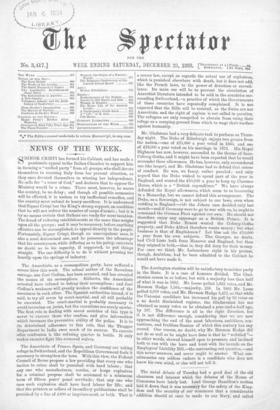Mr. Gladstone had a very delicate task to perform on
Thurs- day night. The Duke of Edinburgh enjoys two grants from the nation,'—one of 215,000 a year voted in 1866, and one of 210,000 a year voted on his marriage in 1873. His Royal Highness has now, however, succeeded to the throne of Saxe- Coburg-Gotha, and it might have been expected that he would surrender these allowances. He has, however, only surrendered one (the larger), and Mr. Gladstone had to defend that course of conduct. He was, we fancy, rather puzzled ; and only argued that the Duke wished to spend part of the year in England, and wanted the 210,000 a year to keep up Clarence House, which is a "British expenditure." We have always defended the Royal allowances, which seem to us beseeming in a Monarchy, but we cannot defend this arrangement. The Duke, as a Sovereign, is not subject to our laws, even when residing in England—vide the johore case decided only last month—and if Germany were to go to war with us, he ought to command the German Fleet against our own. He should not therefore enjoy any appanage as a British Prince. It is suggested that Duke Ernest wasted the Coburg-Gotha, property, and Duke Alfred therefore wants money ; but what business is that of Englishmen ? Let him ask the £10,000 a year from his own subjects. The Georges, no doubt, had Civil Lists both from Hanover and England, but then they reigned in both,—that is, they did duty for their money. For once we think Mr. Labouchere right in his protest, though, doubtless, had he been admitted to the Cabinet he would not have made it.


































